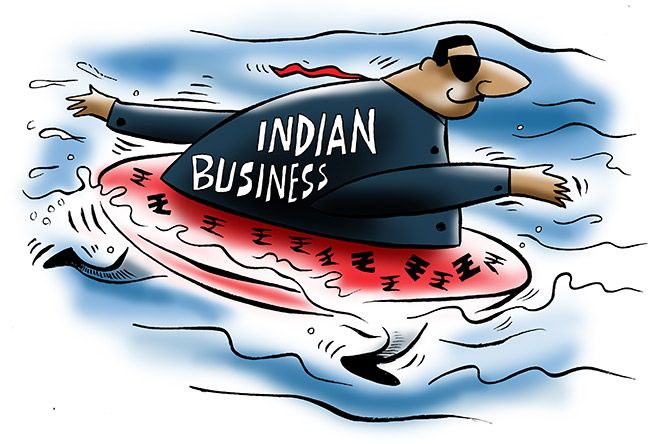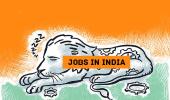'When you forgive a farmer's loans there is this ideological economists lobby which says: 'That's socialism. And that's bad'.'
'But to forgive the loans of big people, so that they will be interested to invest further is capitalism and is good.'

Arun Maira has been introduced many times, in various fora, as a thought leader.
The author of several books, some on how India can confidently stride forward, Maira, who was on India's planning commission till 2014 and has extensive experience working in both the private (25 years with the Tatas) and public sectors, is certainly a man of many intriguing ideas.
In Mumbai recently to participate in the Tata Literature fest, he was part of a discussion on Compassionate Capitalism along with former McKinsey chairman Rajat Gupta and Nadir Godrej, managing director, Godrej Industries.
Compassionate capitalism, verging on a hybrid desi variety of socialism, is something Maira whole-heartedly believes in and spoke about strongly at the session, which saw him and Gupta disagree often.
He feels in a world where the trickle down to the less well-off has been nearly invisible, the Big Companies and the Big Guys have had it too easy.
A defender of micro-economics, Maira is hoping for a new tomorrow.
"The big guys don't need our help. In fact, we have to control them," Maira tells Rediff.com's Vaihayasi Pande Daniel in the first of a two-part interview.
What bothers you most about the current economic situation? What about this issue is slightly exaggerated or maybe it is underplayed?
I believe, from all anecdotal evidence, as well as now quantitative evidence, the data evidence, that the economy is not doing well.
The anecdotal evidence about people not finding enough jobs and incomes.
You can see the evidence, engaged a little bit, but not enough to be confident to be fully about themselves and not earning enough to be able to spend as much as companies, who are selling them things, would like them to spend, which is why there is a decline on the consumer side.
On the infrastructure side also.
There is a decline in economic activity of the country.
So there is no question the economy is not doing well.
Certainly not well enough to be able to create enough income and jobs for the people of this country.
What are some solutions for boosting job creation, small industries and entrepreneurship?
Well, let's get right that we have to have An Idea about our economy.
And An Idea about how our economy will grow now on.
And we must get this right: Our economy, like all economies around the world, has a large bottom to it.
It is the people themselves, doing small work, small enterprises, who are really the foundation of all economies.
In our economy, we have neglected this part of the economy due to -- if I might say -- for an idea, that has been growing for the last 30 to 40 years -- that looking after the small people and small enterprises is either socialism or it is Gandhism.
It is, you know, some backward idea.
We should be looking at what is going to be pleasing to the Big Guys, who have the Big Money, and they would then come and invest their money and somehow, thereafter, there would be some trickle down and the guys at the bottom are going to see some benefit.
This idea has been disproven around the world. Not just here.
So we need A New Idea.
A New Idea in economics and governance, which would grow economies in ways which are inclusive and sustainable.
So the debate in the country, right now, has to recognise that there is an ideology which has been running our policies, which is not the socialist ideology.
It is not the Gandhian ideology.
It is actually the Other Ideology.
But any time someone suggests that we need to look after the small enterprises.
Or the education and health of small people, either it was dismissed as socialism and that we will have to first get rich before we do it.
To get rich we keep pandering to the big companies, enabling them to invest more by inviting them to pay less taxes and so on.
There is an ideological shift necessary.
I think, that when some people within the country use the word swadeshi we associate the word swadeshi with protectionism.
And when you say swaraj, which means we got to be independent -- that is what China has been wanting to be and has become, that's what the USA keeps saying: Better recover our own independence, economically. That's how it should be!
All countries need to ensure that their people have got incomes and jobs and therefore are able to spend on the goods from other countries, otherwise how is the world economy going to grow?
So asking countries and their governments to look at the conditions of their own people first is not a bad thing.
It is the necessary thing.
But if you say that, they say: 'Oh you are being protectionist. You are not being part of the global narrative'.
That's why globalism -- if I might say -- is collapsing.
What you have just said brings to mind two thoughts: Firstly, when Kamal Nath took over as chief minister of Madhya Pradesh, one of his first moves was that he forgave farmers their loans. I read somewhere that the money he forgave the farmers was a small drop compared to the amounts that various businessmen have racked up from public sector banks.
Secondly, what's wrong with NREGA (National Rural Employment Guarantee Act)? The programme has got a lot of criticism from many quarters. It was devised by the previous government. But it is still being used. That underlines your 'socialism' point
Absolutely.
When you forgive a farmer's loans there is this ideological economists lobby which says: 'That's socialism. And that's bad'.
But to forgive the loans of big people, so that they will be interested to invest further is capitalism and is good.
I mean they don't need that help.
The poor person needs the help just to survive.
And it is much smaller.
Exactly.
So we come to looking after the insides of your economy.
We have at this moment -- fortunately we have so many states in this country, you mentioned Madhya Pradesh, which is one of them and the chief minister can do something -- we have a lovely experiment going on in Delhi with the Aam Aadmi Party.
They have, for the last five years, been working on public health, public education, ensuring that there is piped water to all these otherwise unauthorised colonies, that there is cheap electricity and reliable, without breakdown, everywhere in Delhi.
And that the electricity prices are being reduced.
Water prices are being reduced.
Again people will say: 'That's all socialism'.
I read your article on that...
Put the numbers together.
And as you put the numbers together, they are computerised, and I have looked at them and they are right.
The savings per family is about Rs 4,000 (per month), which otherwise they would have spent paying for water tankers or expensive medicine or doctors or private school education.
They got all that saving.
They are spending that and they can spend all that to make the capitalist economy grow.
Looking after the basic needs of people -- which only governments can do equitably -- is the way to go.
Singapore -- I wrote in the same article -- again is the same model.
When you go back to Singapore they say the purpose of a government is to look after the welfare of common citizens.
The big guys don't need our help.
In fact, we have to control them, because they, just for the sake of making a profit, rape the economy.
So these are the models.
China has done very well by that model.
So you are saying the Aam Aadmi Party is doing quite a good job?
Yes, and there is a model here.
We in India have to use the right model for the growth of our economy.
How do you see NREGA?
As an idea it is the necessary idea.
If people don't have any way to earn incomes, then either you put them into some poverty camp and be feeding them, which is costly.
Or you let them get some dignity so they earn an income. I am going to give you the work that I can, because you are not running an industry.
So you give them work that does not require much capital, like building a road or cutting some channel or something
But they are doing something and they are earning and they are getting some income to support themselves.
Also if you choose that work wisely we do need to take care of our water bodies, we do need to keep our roads under repair, they are helping to grow the infrastructure of the country.
It is the right idea.
People's criticism is either ideological ones: 'Oh this is useless work and people being given money'.
I am countering already. It is a good idea.
The other is the execution of it.
There are many stories about the roads weren't completed, people weren't paid.
But that you have in any (form).

Couldn't this economic slowdown been predicted beforehand? Wasn't there any way of predicting it? And what else is on the cards? Is there something worse ahead of us?
Let me say this to you. I joined the planning commission in 2009. That's the time India's economy was growing.
But, on the other side, we were getting all these statistics and numbers which started by companies saying that they don't get skilled people.
Then someone said this is strange.
In a country that has millions of people looking work, how come our companies don't find enough people to skill themselves maybe or skilled people.
That was when we began to see the disconnects.
How people measure their own progress -- that is companies - and what they expect of the system.
That: 'You produce skilled people and then we are going to make more investment. That's your job.'
But the people outside say: 'Unless I get some work to do I can't develop a skill'.
It goes together in the system, that both the supply side and demand side must grow together as a system.
You can't pass off the responsibility to these people who want to invest or for everything onto the government.
'Give me land free. Get these damn NGOs out of my way, when they say I am overusing the water or the water levels are going down or otherwise I won't invest'.
The consequences we are suffering now.
One could see, anecdotally perhaps, and through sets of numbers, that there was a problem at the bottom.
The growth was not sustainable.
It was not sufficiently inclusive.
So while we kept saying in the 12th five year plan and the one before that, that our plan is about faster, more inclusive, more sustainable growth.
But we kept focusing on the faster and measuring the GDP.
Were we actually gathering enough data to establish whether inclusion was happening or sustainability was happening?
When you talk about inclusion happening, it came into employment, which was the best way.
People earn enough.
Then they are included in the growth.
Then the contest: 'But enough people are being employed'.
It is still going on to this debate. Wasting time...
So you are saying this is something that will continue? In the future as well? Unless people get this sorted?
Unless we focus ourselves on the real issues -- on inclusion and measures of real inclusion, which means people's incomes must be growing, equitably, vastly on the bottom of the pyramid.
And on sustainability -- our water, our pollution, land cover, soil quality.
We must measure these things.
So our GDP can't be the only indicator.
This business of 5 trillion... 12 trillion... When the NITI Aayog itself says that in 2030 India's requirement of fresh water will be double what India will have, unless you change the shape or the pattern of the growth, what is 12 trillion?
I can't imagine what India would be like if it were a $12 trillion economy without any water.
Who will be living here?
Robots, who don't need water?
But they need more water, actually, than human beings do.
So there is a craziness here about understanding it's a system, in which there are real people.
It is a system in which there is an environment.
And you have got to conceive of the whole system being healthy.
And not just one number growing.
Part 2: 'You are in a crisis. You need to do things quickly'










